Since the pandemic began, I’ve been encouraged to see state and local public health officials from all across the country working hand-in-hand with business leaders to encourage people to wear masks, reinforce stay-at-home guidance, and help people be safer in public places such as grocery stores and restaurants. This partnership makes good sense because it’s never been clearer that our safety, security, and economic prosperity are fully dependent on a robust public health system.
Encouraging collaboration between public health and business leaders has been a priority for the de Beaumont Foundation. Rationale for why companies can do well by doing good was laid out pre-pandemic in a report we commissioned from the Bipartisan Policy Center in the spring of 2019. And this week, we released another report with the Institute for Health and Productivity Studies (IHPS) at the Johns Hopkins University Bloomberg School of Public Health that describes seven specific strategies business leaders can do now — and, importantly, post-pandemic — to help us be better prepared for future public health crises.
These recommendations are not about public health experts advising businesses on how to strengthen our public health infrastructure. Instead, the guidance is based on focus groups of 40 business and public health leaders — including executives from Disney, Goodyear, IBM, Sodexo, USAA and others. We listened, took notes, and went back to them to synthesize what we heard and clarify what’s realistic and truly actionable. A few examples of where we heard businesses can — and want to — play a role in community health (the full list is here):
- Amplifying, supporting, and reinforcing scientifically based guidance on mask wearing, social distancing, testing, contact tracing and vaccinating.
- Helping employees stay healthy through workplace health and wellness programs.
- Looking outside the workplace walls to improve the health of the communities where employees (and customers) live.
- Advocating for policies that improve public health, such as affordable housing, safe streets, paid sick leave, childcare services, livable wages, and access to healthy food and recreation.
To help spread the word and further engage business leaders, we also sponsored a Washington Post Live forum this week to spotlight on a national stage how private companies are responding to today’s health challenges and supporting long-term preparedness and a healthy workforce. IPHS Director Ron Z. Goetzel and I participated along with Karen DeSalvo, Chief Health Officer of Google Health; Heyward Donigan, CEO of Rite Aid; and Henry Ting, Chief Health Officer of Delta Air Lines.
Having leaders like these align with public health creates a powerful partnership opportunity because they are trusted figures in their communities and often have long-standing relationships with public officials. Further underscoring the need for business to be involved in public health, the 2021 Edelman Trust Barometer showed that the public trusts business more than the government or any other group to solve our nation’s problems. In the context of significant socio-economic disparities, political polarization, and dangerous misinformation, employers have an opening to not only help address COVID-19, but also champion new policies and practices that center racial equity — including those that support improved community health.
I suspect that many of you reading this may have a working relationship with a business leader, or if not, I hope you will reach out to a local stakeholder in the private sector to forge one. We can all play a role in strengthening these partnerships by engaging with business leaders in our communities to make sure they understand how to begin, and ultimately, stay engaged in preparedness planning.
Despite the practicality of such a mutually beneficial relationship, we must recognize that businesses are often accountable to shareholders, meaning longer-term health outcomes may not be a priority. However, a year into the pandemic, business leaders also now recognize, perhaps more so than ever before, that they are accountable to others — their employees, communities, and customers. And these corporate values may in turn, attract top talent, motivate employees, and improve a company’s brand — all considerations that are critical to a company’s bottom line.
For all of the challenges and inequities the pandemic has highlighted, it has also shown us that business and public health leaders working together to help drive policies and efforts that can create healthier communities are key to a resilient workforce and strong economy.





